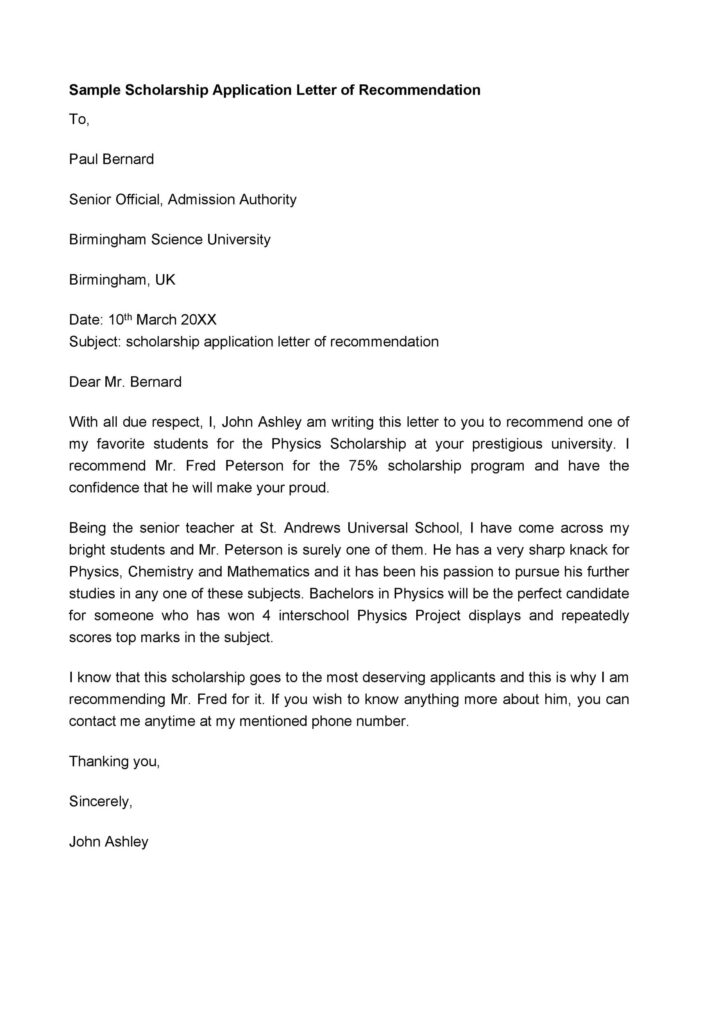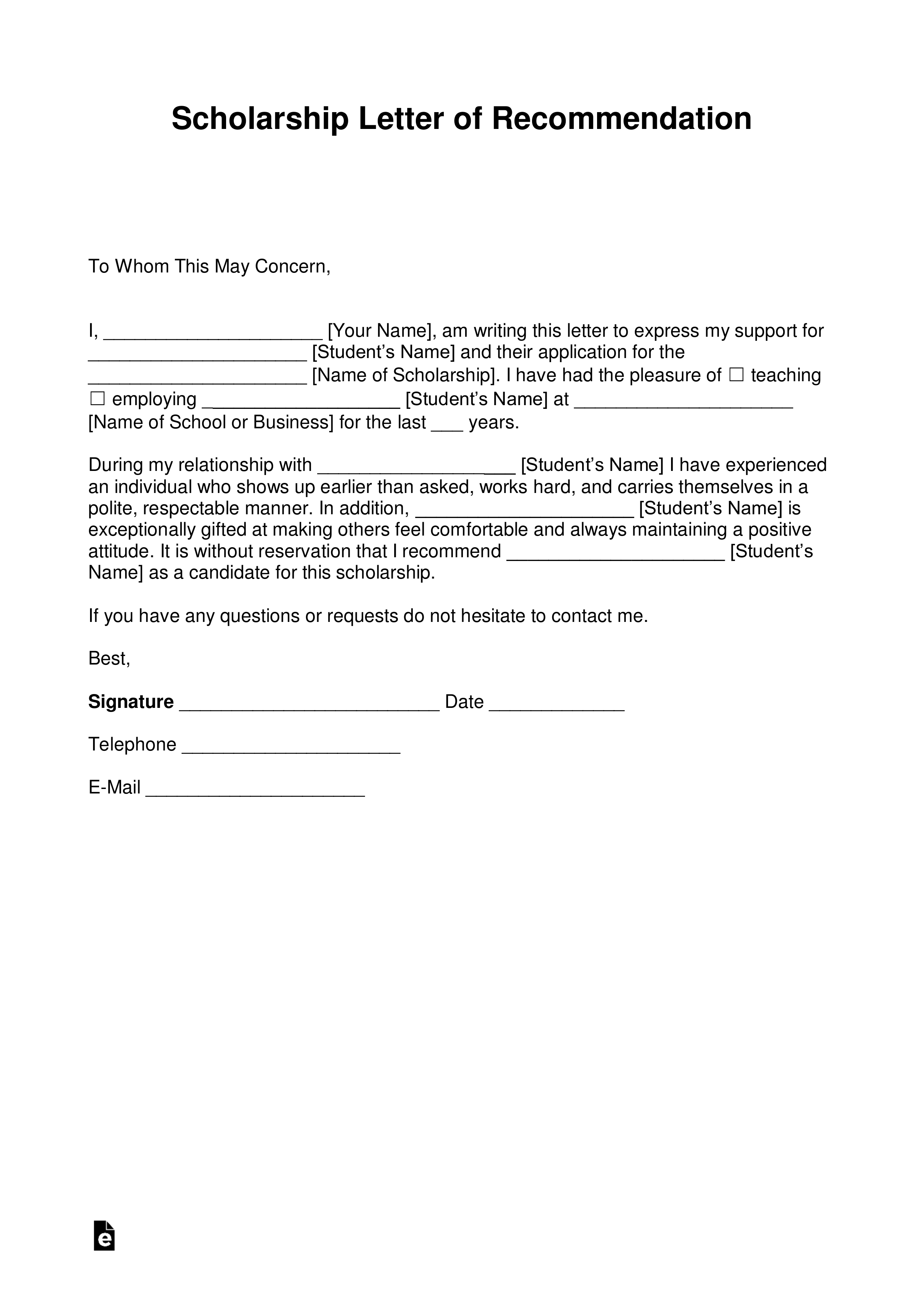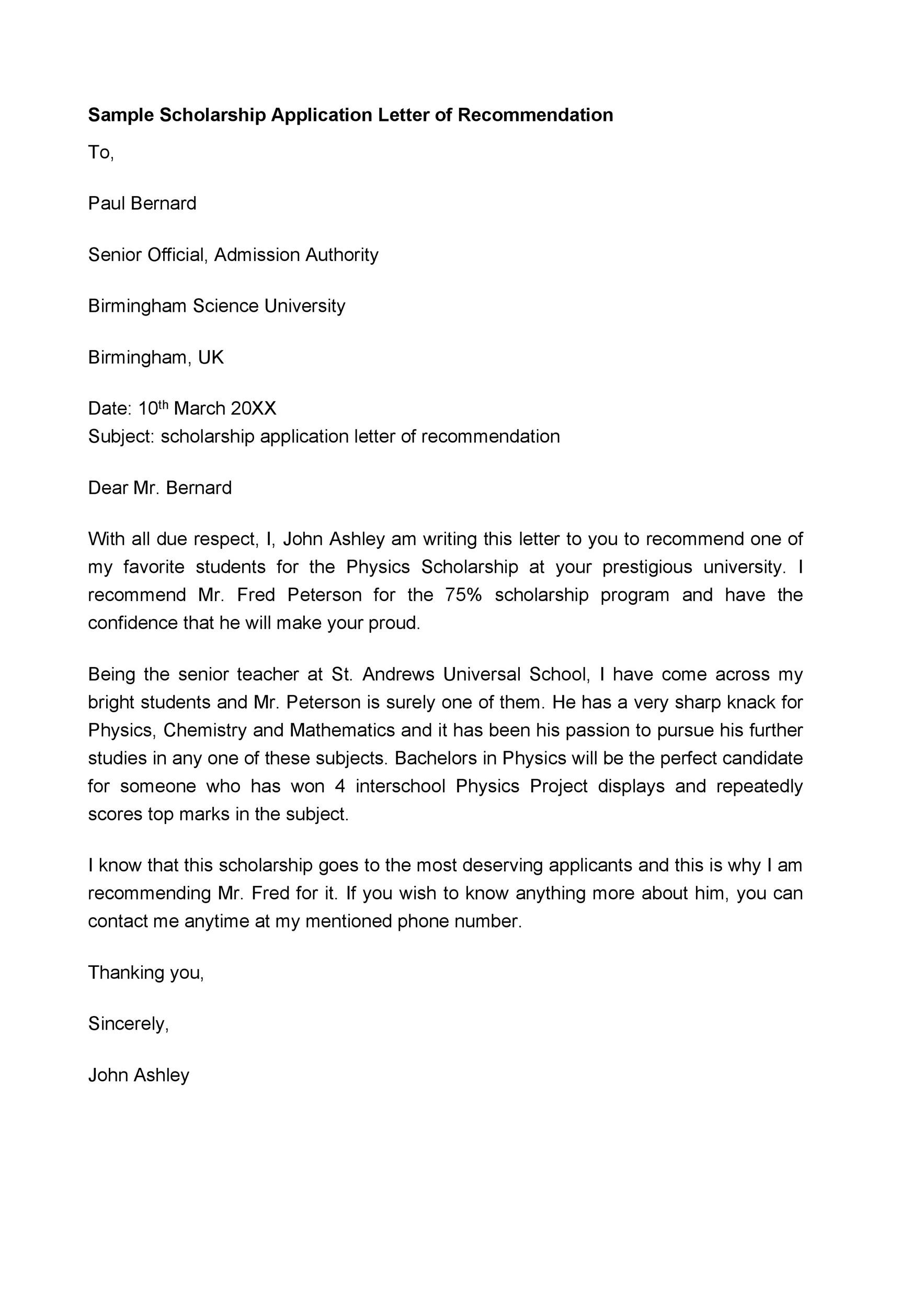How to Get Recommendation Letters for Scholarships

Securing scholarships often hinges on more than just stellar grades and impressive test scores. Recommendation letters provide a crucial third-party perspective, showcasing your character, work ethic, and potential from the viewpoint of someone who knows you well. These endorsements can significantly strengthen your application, making you stand out from a pool of equally qualified candidates. But how do you navigate the process of requesting and obtaining compelling letters of recommendation? This article provides a comprehensive guide, from identifying the right recommenders to ensuring they have the information they need to write a glowing and impactful letter that boosts your scholarship chances.
How to Secure Powerful Recommendation Letters for Scholarships
Crafting a compelling scholarship application often hinges on the strength of your recommendation letters. These letters provide an external validation of your skills, character, and potential, offering scholarship committees a glimpse into who you are beyond your grades and test scores. The process of obtaining strong recommendations requires careful planning, respectful communication, and providing recommenders with the tools they need to advocate for you effectively. Remember, a generic or lackluster recommendation can weaken your application, so it's crucial to invest time and effort in securing letters that truly highlight your strengths and suitability for the scholarship. This involves not only identifying the right recommenders but also guiding them through the process to ensure they can write a persuasive and personalized letter on your behalf.
Identify Ideal Recommenders
The most effective recommenders are individuals who know you well and can speak specifically to your academic abilities, leadership qualities, or personal attributes relevant to the scholarship. Prioritize those who have witnessed your strengths firsthand, such as professors who have taught you in multiple courses, advisors who have mentored you, or supervisors who have observed your work ethic and dedication. Avoid asking family members or close friends, as their perspectives may be perceived as biased. Instead, focus on individuals who can provide objective and insightful assessments of your capabilities and potential for success, referencing specific examples that demonstrate your skills and character.
Give Ample Notice and Clear Instructions
Approaching potential recommenders with a last-minute request is a surefire way to receive a rushed and potentially unenthusiastic letter. Ideally, you should ask for a recommendation at least one month before the deadline, allowing your recommender ample time to reflect on your qualifications and craft a thoughtful and personalized letter. When you make your request, provide clear and concise instructions, including the scholarship's requirements, the deadline for submission, and any specific themes or qualities the committee is seeking. This information empowers your recommender to tailor their letter to the specific criteria of the scholarship, significantly increasing its impact.
Provide a Comprehensive Information Packet
To enable your recommenders to write compelling letters, equip them with a comprehensive information packet that showcases your accomplishments and aspirations. This packet should include your resume or curriculum vitae, a transcript of your academic record, a personal statement or essay outlining your goals and motivations, and a detailed description of the scholarship you are applying for. You should also include a brief summary of your interactions with the recommender, highlighting specific projects, courses, or experiences where you demonstrated your strengths. This packet serves as a valuable resource for your recommender, providing them with the information they need to craft a personalized and impactful letter.
Follow Up Respectfully and Offer Assistance
After you have requested a recommendation, it is crucial to follow up with your recommender to ensure they have everything they need and to address any questions or concerns they may have. Send a polite reminder a week or two before the deadline, expressing your gratitude for their willingness to support your application. Offer your assistance in any way possible, such as providing additional information or clarifying any aspects of your application. This proactive approach demonstrates your respect for your recommender's time and effort, while also ensuring that they are well-equipped to submit a strong letter on your behalf.
Express Gratitude and Stay in Touch
Once your recommenders have submitted their letters, express your sincere gratitude for their time and effort. A simple thank-you note or email is a thoughtful way to acknowledge their contribution to your scholarship application. Beyond expressing gratitude, maintain contact with your recommenders and keep them updated on your academic and professional progress. This ongoing relationship not only strengthens your connections but also provides them with valuable insights into your development, which can be beneficial for future opportunities.
| Key Action | Description | Timing |
|---|---|---|
| Identify Recommenders | Choose individuals who know you well and can speak to your relevant skills and qualities. | At least 2 months before the deadline. |
| Request Recommendations | Ask politely and provide clear instructions and deadlines. | At least 1 month before the deadline. |
| Provide Information Packet | Include resume, transcript, personal statement, and scholarship details. | Immediately after requesting the recommendation. |
| Follow Up Respectfully | Send a reminder and offer assistance a week or two before the deadline. | 1-2 weeks before the deadline. |
| Express Gratitude | Thank your recommenders after they submit their letters and keep them updated. | Immediately after submission and periodically thereafter. |
Who can write me a letter of recommendation for a scholarship?

Academic Professors and Teachers
Academic professors and teachers are often excellent choices, especially if they've taught you in relevant courses or have supervised your research.
- They can attest to your academic abilities, such as your critical thinking, problem-solving skills, and understanding of the subject matter.
- They can comment on your classroom participation, your work ethic, and your ability to collaborate with peers.
- They can highlight your specific achievements in their courses, such as outstanding projects, presentations, or exam scores.
Academic Advisors and Mentors
Academic advisors and mentors, especially those you've worked with closely over time, can offer valuable insights into your academic and personal growth.
- They can discuss your long-term goals and how the scholarship aligns with your academic trajectory.
- They can speak to your potential for success in your chosen field.
- They can elaborate on your unique strengths and how you've overcome challenges.
Supervisors from Internships or Jobs
Supervisors from internships or jobs can provide insights into your professional skills and work ethic.
- They can highlight your practical skills, such as your ability to manage projects, meet deadlines, and work as part of a team.
- They can comment on your leadership potential, your initiative, and your problem-solving abilities in a real-world setting.
- They can provide specific examples of your contributions to the organization and your positive impact on the workplace.
Coaches or Extracurricular Leaders
Coaches or leaders of extracurricular activities can speak to your character, teamwork skills, and dedication.
- They can highlight your leadership qualities, your commitment to the team or organization, and your ability to motivate others.
- They can comment on your sportsmanship, resilience, and perseverance, especially when facing adversity.
- They can provide specific examples of your positive contributions to the group and your ability to work towards a common goal.
Community Leaders or Volunteers Organizations
Community leaders or representatives from volunteer organizations can speak to your commitment to service and your impact on the community.
- They can describe your passion for helping others, your empathy, and your understanding of community needs.
- They can highlight your skills in communication, organization, and problem-solving, and your ability to work effectively with diverse groups of people.
- They can provide specific examples of your positive impact on the community and your dedication to making a difference.
How do you request a scholarship recommendation?

Choosing the Right Recommender
Choosing the right recommender is crucial for a strong scholarship application. Consider individuals who can speak to your strengths and abilities, and who have a positive impression of you. A vague or generic recommendation letter can hurt your chances. Aim for recommenders who can provide specific examples of your achievements, leadership qualities, and personal characteristics. Look for people who have known you for a longer time, and have had ample opportunity to see you in action.
- Consider professors from courses where you excelled: They can comment on your academic abilities and work ethic.
- Think about supervisors from extracurricular activities: They can discuss your leadership skills, teamwork abilities, and commitment.
- Approach mentors or advisors: They may have a broader perspective on your goals and potential.
Preparing Your Request Materials
Providing your potential recommenders with comprehensive materials is essential. This will allow them to write a detailed and personalized letter that highlights your strengths and qualifications. The more information you give them, the better they can advocate for you.
- Resume: A concise overview of your academic and professional experience.
- Transcript: Demonstrates your academic performance.
- Personal statement (if available): Provides insight into your goals, motivations, and personality.
- Scholarship description and criteria: Helps them understand what the scholarship committee is looking for.
Crafting a Professional Email
Your initial email is your first impression. A professional and polite email increases the likelihood of a positive response. Start with a proper greeting, clearly state your request, and provide context and information. Be mindful of their time and express your appreciation.
- Use a formal greeting: "Dear Professor [Name]," or "Dear Dr. [Name],"
- Clearly state your request: "I am writing to request a letter of recommendation for the [Scholarship Name]."
- Provide a brief overview of the scholarship: "[Scholarship Name] is a [type of scholarship] that supports students pursuing [field of study]."
- Mention why you are a good fit: "I believe my [relevant skills/experiences] make me a strong candidate for this scholarship."
Following Up and Expressing Gratitude
Following up after your initial request is important to ensure the recommender has everything they need and to confirm that they are able to write the letter. After the recommender submits the letter, always send a thank-you note expressing your appreciation for their time and effort. This reinforces your professionalism and builds a positive relationship.
- Send a reminder a week before the deadline: A polite reminder helps ensure they haven't forgotten.
- Express your gratitude in writing: A thank-you note shows your appreciation for their support.
- Keep them informed of the outcome: Let them know if you receive the scholarship (or not).
Addressing Potential Challenges
Sometimes, recommenders may decline your request. It's important to respect their decision and have alternative options in mind. They might be too busy, or they might not feel they know you well enough to write a strong letter. Don't take it personally; simply move on to your next option.
- Have backup recommenders in mind: It's wise to have a list of potential recommenders.
- Respect their decision if they decline: Thank them for their consideration and move on.
- Don't pressure anyone to write a letter: A reluctant recommender is unlikely to write a strong letter.
What is an example of a scholarship recommendation?

Highlighting Academic Achievements
- Clearly state the student's academic standing and how they performed in your class or program. This can include their GPA, specific grades in relevant courses, and overall academic performance.
- Provide specific examples of projects, assignments, or research where the student demonstrated exceptional skills and knowledge. Avoid vague statements and instead focus on concrete accomplishments.
- If applicable, mention any awards, honors, or recognitions the student has received for their academic achievements. This adds credibility to your assessment of their academic abilities.
Demonstrating Character and Personal Qualities
- Focus on qualities like leadership, teamwork, perseverance, and integrity. Provide anecdotes or examples to illustrate how the student embodies these traits.
- Highlight the student's work ethic and dedication. Mention their ability to meet deadlines, handle challenges, and go above and beyond expectations.
- If the scholarship emphasizes certain values (e.g., community service, innovation), connect the student's qualities to those values. Show how their character aligns with the scholarship's goals.
Providing Specific Examples and Anecdotes
- Avoid generic statements and use specific examples to support your claims. Rather than saying "the student is very intelligent," describe a time when they demonstrated their intelligence in a specific situation.
- Use anecdotes to bring the student's story to life. Share a brief story that illustrates their personality, skills, or accomplishments. This makes the recommendation more engaging and memorable.
- Ensure the examples you provide are relevant to the scholarship's criteria. Tailor your recommendation to highlight the qualities and achievements that are most important to the scholarship committee.
Explaining the Impact of the Scholarship
- Briefly explain how the scholarship would benefit the student and enable them to achieve their goals. This could include reducing financial burdens, allowing them to focus on their studies, or providing access to resources and opportunities.
- Highlight the student's potential to contribute to their field or to society. Show how the scholarship would help them make a positive impact on the world.
- Make a strong and confident statement about your recommendation. Reiterate your belief in the student's abilities and potential, and express your support for their application.
Maintaining a Professional and Concise Tone
- Use professional language and maintain a formal tone throughout the recommendation. Avoid slang or overly casual language.
- Be concise and to the point. Focus on the most important information and avoid unnecessary details.
- Proofread your recommendation carefully for grammar and spelling errors. A well-written recommendation demonstrates your professionalism and attention to detail.
Frequently asked questions
How far in advance should I ask for a recommendation letter?
It is crucial to ask for recommendation letters well in advance of the scholarship deadline, ideally at least one month prior. This gives your recommenders ample time to write a thoughtful and compelling letter without feeling rushed, increasing the quality of the recommendation and demonstrating your respect for their time.
Who should I ask to write my recommendation letters?
Choose recommenders who know you well and can speak to your strengths, skills, and achievements. Ideal recommenders include teachers, professors, mentors, or supervisors who have observed your abilities in an academic, extracurricular, or professional setting and can provide specific examples to support their claims.
What information should I provide to my recommenders?
Provide your recommenders with all the necessary information to write a strong letter, including your resume, transcript, a personal statement or essay if required, the scholarship requirements, and the deadline for submission. Giving them context about your goals and why you need the scholarship helps them write a personalized and impactful recommendation.
What if a recommender says no?
If a recommender declines your request, thank them for their time and understanding. It is essential to have other potential recommenders in mind as backup options. Don't take it personally; they may be too busy or feel they cannot write a strong enough letter for you. Move on and focus on securing recommendations from individuals who are enthusiastic and well-positioned to support your application.
